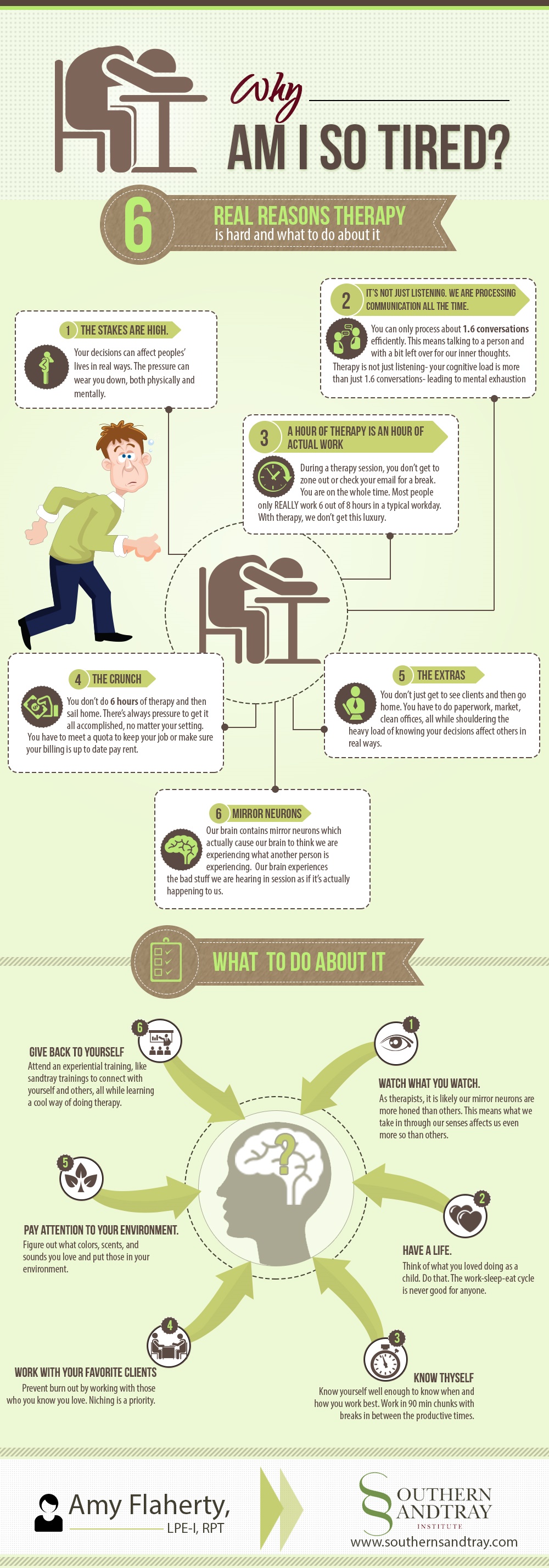My apologies, gang – to you and to Amy Flaherty! It seems we had an email glitch that resulted in her beautiful infographic getting posted without the actual blog post! Let’s try this again!
On Tuesday, Amy joined us to talk about The One Thing Every Psychotherapist’s Partner Doesn’t Get. Today, she’s back to tell us how to prevent and how to deal with that weighty fatigue that that comes with our demanding work as psychotherapists.
___________________
A Guest Post by Amy Flaherty, LPI-E, RPT
Wait- don’t just read The One Thing Every Psychotherapist’s Partner Doesn’t Get. Save it, print it out and remember it for those days when you are dead tired and people ask, “What’s the matter? You only had 20 hours of billing this week!“ Just a little helpful suggestion.
So now, like the good solution-focused therapist I am, I’m not one to focus only on the negative but instead want to talk about what we can do to improve our plight as therapists.
Of course, this list (and the corresponding infographic) is not exhaustive and honestly, I’ve tried to steer away from therapy buzz words such as “self-care” and “mindfulness.”
As a side note-I’ll admit, there are times when I feel like screaming if one more person asks me what I’m doing for “self-care” when I’m just trying to vent and feel sorry for myself. But that’s another blog post…
6 Ways to Deal with Therapy Being Hard
1.Watch what you watch. I wrote about mirror neurons in the last post. We are constantly bombarded by problems in the sessions and likely have a high level of empathy. Having these well-developed mirror neurons help us to be insightful therapists. But there’s a down side to this as well. We are likely to feel things even more so than others
Here’s one solution: Be aware of what you take in with your environment. Certain television shows and movies I just can’t handle after a long day.
Some days I just need a mindless book reading of the latest teen vampire novel. It’s fine. I don’t get triggered.
What I can’t take is the shows that make my body physically react in a negative way. One of my trigger shows is Hannibal. It may be your favorite show, but be aware of what you are taking in and how it affects your body, because again, your brain is processing all of this information as if it is happening to you.
2. Have a life. This seems like a no-brainer. Actually, for me, it’s something I have to constantly cultivate. My fallback automatic response is to just sleep and hibernate after seeing clients.
There are days when I do this and it’s helpful but too much leads to only having the work-eat-sleep cycle, which isn’t healthy for anyone.
Don’t feel guilty about having lunch with a friend instead of working every lunch time. What other profession will just work through lunch, not take breaks and not then be surprised when quality decreases? Not many, and not if they are smart about productivity. Which leads me to my next point..
3. Know thyself. Figure out when you do your best work and work around this. Chances are you know if you are a night-owl or an early-bird. Studies have shown that we do our best work in 90 minute chunks with breaks in between the sections of time.
Figure out when your best time to work is (mine is mid-morning) and do all of your other tasks then, like cleaning, catching up on emailing, or writing blog posts. Again, I realize I’m not saying anything earth-shattering, but the little things like scheduling around yourself does matter.
4. Work with your favorite clients. This goes back to #3 because you have to know who your favorite clients are before you can attempt to work with just those.
For me, I do some of my best work with those clients who are outside of what society deems “normal.” I love providing these clients with a judgment-free space to help them be the person they were meant to be. However, I hate working with couples. I tried it for a while (working with couples) and found that I was way more exhausted after an hour of couples work than with my ideal client.
I know some of you are exclaiming “What- how can I do that, I have to make a living, are you crazy?” I won’t go into all the benefits of nicheing but you can check out a few with this blog post.
5. Pay attention to your environment. Going back to the discussion about mirror neurons, we are affected by what is around us. Studies show our environment can greatly affect our emotions. You are going to be much more likely to feel enthused and excited about working with your clients in a space where YOU feel tranquil.
Decide what colors soothe you best and add in those things- as well as fabrics and other items that represent you. My good friend did a great job of this with her new private practice office.
6. Give back to yourself. One of the best things I do for myself (aside from taking vacations and spending time with my family) is attending really quality, experiential trainings. I know this is one of the reasons I believe so much in sandtray trainings-because I get so much detox myself as well as the benefit of learning cool new techniques in the trainings that I attend.
When you attend experiential, hands-on trainings, you not only get to clear off your own mirror but also get to make connections with other like-minded therapists. I’ve designed my training program, Southern Sandtray Institute to do just that- provide detox and connections. I’ve seen it change people over and over again.
Connecting with others in a quality way increases your ability to handle stress and just helps you not feel so alone on those days when you are like “why did I choose THIS profession?”
Again, this is in no way an exhaustive list, but my core take-home message is this:
Be nice to yourself. You deserve it. You can’t serve from an empty cup.
Does any of this connect with you? What are your favorite ways to revitalize when you are feeling lost and tired? I’m always looking for more “self-care” ideas!
___________________
About the Author: Amy Flaherty, LPE-I is a Registered Play Therapist in Northeast Arkansas. She provides personalized trainings in sandtray therapy for all therapists (not just those who work with kids) through her business – the Southern Sandtray Institute. Here is where you can sign up for her free webinar and learn more about her training that leads to certification as a Registered Integrative Sandtray Therapist (RIST).
in Northeast Arkansas. She provides personalized trainings in sandtray therapy for all therapists (not just those who work with kids) through her business – the Southern Sandtray Institute. Here is where you can sign up for her free webinar and learn more about her training that leads to certification as a Registered Integrative Sandtray Therapist (RIST).

This is wonderful. For me, small things make a very big difference. Of course, it’s difficult to have a lot of personal knickknacks in the office because of the boundary concerns, but there are still ways to put small reminders in the office. For instance, I have my pens in a mug from a concert that I went to. Occasionally, a client will ask who is on the mug and I tell them his name and that it is a musician that I enjoy and that’s the end of it. It’s not personal enough to be any kind of intimately personal conversation, but it is a nice reminder.
One thing that works better for me is taking time (even if it’s just 30 seconds at a time) to think of my best friend and that makes me very happy. It’s a very easy, quick, and private way of having a personal moment in the middle of one sometimes seems like everyone else’s chaos.
I have also found (particularly lately) that it’s nice that my closest friends communicate well. Sometimes I find myself truly baffled by how few of my clients seem to understand some of what I consider to be the basics of daily communication.
Lauren, I love that you have personal touchstones in your office , close friends in your circle, and mental habits that provide respite in your day!
This is simply amazing. You both are brilliant! I am lucky to call you colleagues & friends. Fantastic article!!
I’m not a therapist, but I do marketing coaching and I’ve also got a career coaching site, all by phone. It’s the same. If my clients seem unduly stressed, anxious or depressed, I refer them to a therapist – which can be a pretty intense conversation. (Usually they say “thank you – I needed to hear that.”) And people get emotional about their websites, too.
I like the part about environment: I know my cluttered desk isn’t helping. And I’m so glad I’m not the only one who needs to decompress with a relaxing murder mystery or novel at the end of the day! Walking the dog can also be immensely helpful to gain perspective and nothing beats working out with weights or zumba.
Hi, Cathy! Thanks for dropping into Private Practice from the Inside Out! I love your ways of decompressing – especially that zumba workout! Hope you’ll be back often to join the conversations here!